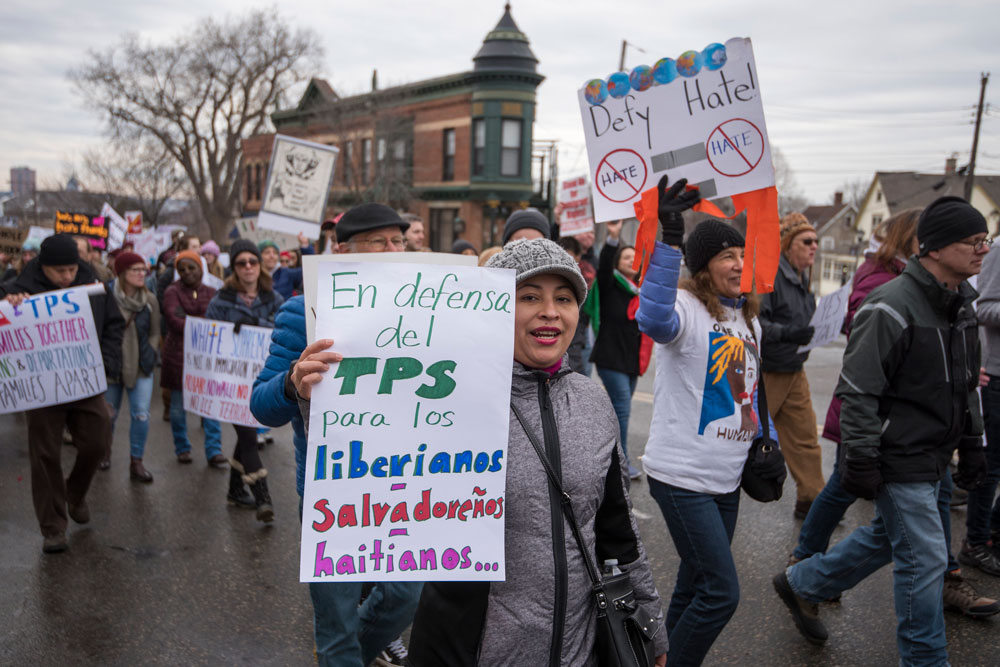
September 14, 2020; National Public Radio (NPR)
“Why are we having all these people from shithole countries come here?”
That’s what President Donald Trump asked lawmakers in a 2018 Oval Office meeting, using a derisive term to describe immigrants from Haiti, Central America, and African nations.
Trump has fostered anti-immigrant sentiment consistently through his time in office, and those efforts have succeeded in shifting immigration law. Just last week, a federal appeals court ruled that the Trump administration can end the humanitarian-focused Temporary Protected Status (TPS) program for over 300,000 immigrants living within the US. When one takes into account that many of these individuals have lived in the US for decades and now have families of their own, the total number of people potentially threatened with deportation and separation is upwards of 400,000 people.
The court ruled in response to a lawsuit filed against the Trump administration by TPS holders that had stayed the termination of TPS designations for El Salvador, Haiti, Nicaragua, and Sudan, first proposed by the Trump administration in 2017 and 2018. The Trump administration has also sought to end TPS for immigrants from Honduras and Nepal, but that matter is being tried as a separate case.
TPS is a humanitarian-focused temporary immigration status granted to people from countries to which it would be very dangerous to return. As of February 2020, immigrants from 10 countries had TPS status due to a variety of ongoing issues, such as armed conflict in El Salvador and Nicaragua, environmental disaster in Haiti, and other extraordinary humanitarian challenges in places like Yemen, Syria, and Sudan. However, the Trump administration has sought to terminate TPS in six of them.
This program has benefitted hundreds of thousands of people. El Salvador has the highest number of TPS recipients—300,000, more than half of whom have been in the US for at least 20 years in response to a bloody civil war. Similar to DACA (Deferred Action for Childhood Arrivals), TPS does not provide a clear pathway to citizenship; it does provide work authorization but ultimately highlights significant problems with the US immigration system that consistently place individuals, families, and communities in worrisome environments with unclear futures.
The TPS advocates offered four main arguments to back their legal claim for their protected status designation to be maintained. The first focuses on the constitutional right for US-born children to live with and be raised by their parents. The second and third focus on the US Department of Homeland Security’s (DHS) supposedly illegal unannounced changes to TPS protocols, along with allegations of outright intentional racial discrimination. Last, they argue these changes, with the unexplained standards in place, violate TPS holders’ due process rights and cite Trump’s racial animosity as evidence.
The appeals court, however, ruled 2–1 in Ramos v. Wolf in favor of the Trump administration. According to a court summary of the appellate judges’ decision:
Sign up for our free newsletters
Subscribe to NPQ's newsletters to have our top stories delivered directly to your inbox.
By signing up, you agree to our privacy policy and terms of use, and to receive messages from NPQ and our partners.
The [judges] explained that, while the district court’s findings that President Trump expressed racial animus against “nonwhite, non-European” immigrants, and that the White House influenced the TPS termination decisions, were supported by record evidence, the district court cited no evidence linking the President’s animus to the TPS terminations—such as evidence that the President personally sought to influence the TPS terminations, or that any administration officials involved in the TPS decision-making process were themselves motivated by animus.
Not surprisingly, advocates for the TPS disagree and have vowed to appeal the court’s ruling. “The racial animus that led to these decisions is real and cannot be ignored,” Beth Werlin, the executive director of the American Immigration Council, stated in reaction to the court’s decision to ignore Trump’s remarks.
This appeal will continue to be fought by advocates and communities, with the outcome of the 2020 election sure to have an effect. In the meantime, worry is palpable, especially for the more than 130,000 active frontline workers.
“This is devastating news not just for families who are losing their protected status, but also for their communities. TPS recipients have deep economic and social roots in communities across the nation,” Ali Noorani, president of the National Immigration Forum, says.
The Center for American Progress estimates that there are at least 11,600 healthcare workers who are TPS holders, such as home health aides, nursing assistants, and technicians. Seventy-six thousand others work in food-related fields, at farms, grocery stores, restaurants, and shipping warehouses.
Separating these people from their families and communities and placing them into countries they no longer remember could have far-reaching traumatic effects for the hundreds of thousands forcibly deported. Moreover, relocating families now would put undue pressure on the countries where they are sent, which, like the US, are currently struggling to contain COVID-19. Economically, for the US, the deportation of these families is projected to lead to a $45 billion loss in GDP and $6.9 billion reduction in tax contributions to Social Security and Medicare.
Putting these people at risk during a pandemic highlights once again the massive investment in division President Trump’s leadership exudes. “This government has failed me and the other 250,000 US citizen children of TPS holders,” Crista Ramos, a lead plaintiff in the case, observed.
“It is deeply disturbing, and frankly enraging,” added SEIU (Service Employee International Union) 32BJ President Kyle Bragg, whose union represents thousands of affected immigrants among its membership.—Chris Cannito













